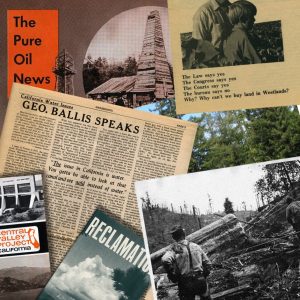New environmental history collections now available through the OAC
The CDL is pleased to announce the availability of over 41 important collections, held by nine institutions throughout California, which document environmental history within and beyond the state. The availability of these previously “hidden” archival collections represents the successful conclusion of a cross-institutional project entitled Uncovering California’s Environmental Collections: A Collaborative Approach. Explore guides (also known as finding aids) to these collections on the Online Archive of California at http://bit.ly/U0hDuO. Guides to additional collections will be published soon. 
The newly processed archival collections document an array of important sub-topics such as irrigation, mining, forestry, agriculture, industry, land use, activism, and research. Together they form a multifaceted picture of the natural world and the way it was explored, altered, exploited and protected in California over the twentieth century. Highlights from the collections include the corporate records of Unocal, a major oil company; the papers of Frank Sherwood Rowland, the Nobel-prize winning scientist who discovered the effects of CFCs on the ozone layer; the records of prominent California leaders in the Sierra Club; and materials on the state’s tidelands controversy, with a complete environmental profile of Los Angeles Harbor.
The CDL collaborated with special collections and archives departments at the following institutions to arrange and describe the materials for scholarly use:
- California State University, Chico
- California State University, Fresno
- Humboldt State University
- UC Berkeley
- UC Davis
- UC Irvine
- UC Los Angeles
- UC Riverside
- University of Southern California
The completion of this project is particularly exciting because it demonstrated the success of working collaboratively across universities to uncover a bulk of hidden material. While each institution independently undertook the processing work, CDL hosted tools, training, and a virtual meeting space to promote the exchange of ideas and advance the archival profession’s approach to uncovering hidden collections. The project made significant inroads into what is known collectively as the “archival backlog”—the trove of historical materials at archival institutions across the country that, due to lack of resources, have not yet been made available to researchers.
The project was generously supported by The Andrew W. Mellon Foundation, administered by the Council on Library and Information Resources as part of its Cataloging Hidden Special Collections and Archives Program, from 2010-2012.
For more information about Uncovering California’s Environmental Collections, see (https://wiki.ucop.edu/display/CLIR).
